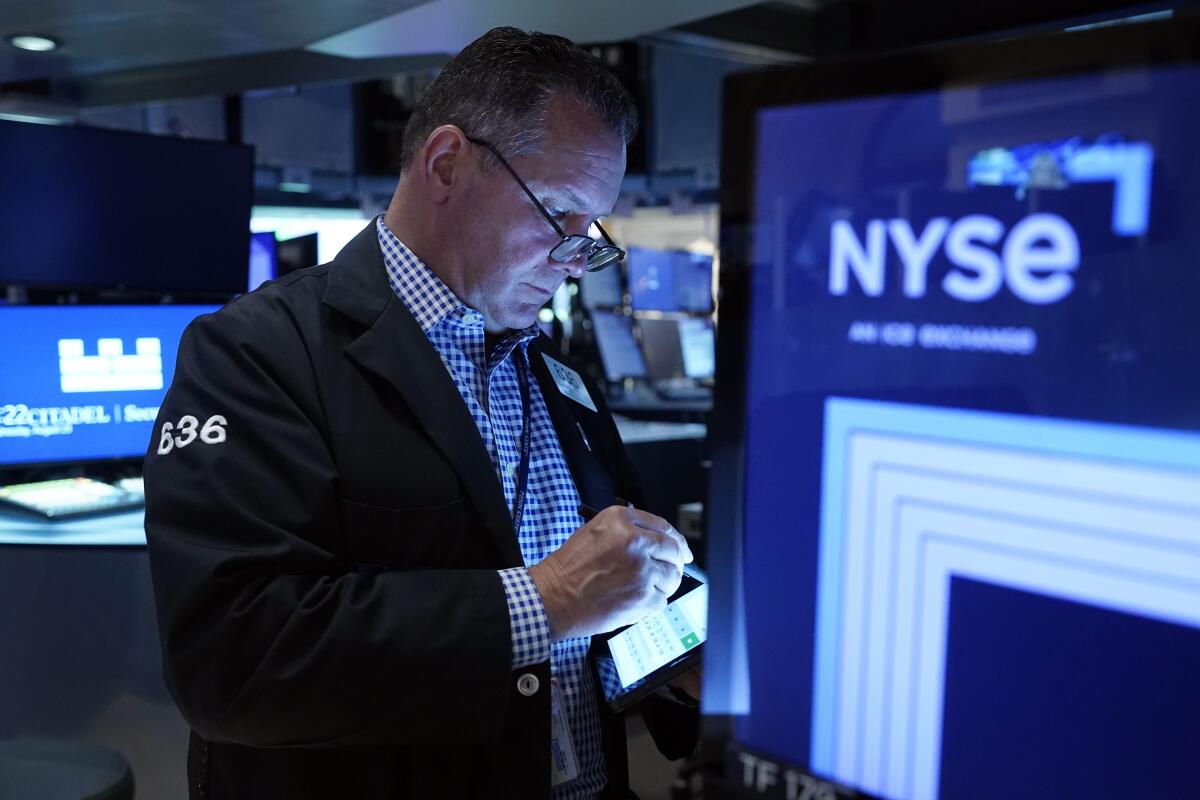Stocks drift lower as oil prices rise and Oracle weighs on tech shares

A slide for technology stocks weighed on Wall Street on Tuesday as the market prepped for a highly anticipated report on inflation due the next day.
The Standard & Poor’s 500 lost 25.56 points, or 0.6%, to close at 4,461.90. The Dow Jones industrial average slipped 17.73 points, or 0.1%, to 34,645.99, and the Nasdaq composite dropped 144.28 points, or 1%, to 13,773.61.
Software giant Oracle helped lead the losses for tech stocks after reporting revenue for the latest quarter that fell just short of what analysts expected. Its stock tumbled 13.5%, even though its profit topped expectations. Oracle’s forecast for how much revenue it will make in the current quarter also wasn’t as strong as some analysts expected.
Apple dropped 1.8% after it unveiled the latest models of its phones and other devices. The stock soared through much of this year, which is crucial for investors because it’s the most valuable company on Wall Street and has more sway on the S&P 500 than others. But it’s been struggling since the end of July and has reported three straight quarters of revenue declines from year-earlier levels.
California Senate passed a bill Monday requiring humans behind the wheel of autonomous trucks for at least five years while safety data are collected. Gov. Gavin Newsom is expected to veto the measure.
Alphabet, meanwhile, fell 1.2% as an antitrust trial against Google opens in federal court. It’s the biggest such trial since regulators took Microsoft to court in 1998. The U.S. government is accusing Google of abusing its position as the world’s dominant search engine and forcing consumers to settle for inferior search results.
On the winning side of Wall Street, stocks of oil producers rose with the price of crude. Exxon Mobil rose 2.9% and was the strongest single force limiting the S&P 500‘s loss. Occidental Petroleum gained 4.1%. Oil prices have been climbing since the end of June after mostly falling for a year.
Stocks broadly have been see-sawing in recent weeks amid uncertainty about whether the Federal Reserve is done with its avalanche of hikes to interest rates. The central bank has already pulled its main interest rate to the highest level in more than two decades as it tries to get inflation down to its target of 2%.
High rates work by slowing the entire economy and knocking down prices for stocks and other investments.
The Justice Department will try to prove Google has been abusing the power of its search engine to stifle competition in ways that discouraged innovation.
Several reports coming up this week could sway the Fed’s thinking. On Wednesday will come the latest monthly update on prices that U.S. consumers are paying across the country.
Economists expect it to show that prices were broadly 3.6% higher last month than a year earlier. Inflation has been mostly cooling since peaking above 9% last summer, but economists warn that the last bit of improvement may be the most difficult to achieve.
Despite more than a year of widespread warnings that a recession was near, America’s economy is, if anything, accelerating.
On Thursday will come reports about inflation at the wholesale level and about sales at U.S. retailers. Strong spending by U.S. households has been a main driver keeping the economy humming, but it could also be encouraging companies to keep trying to raise their prices further.
Several strong reports on the economy recently have allayed worries about a painful recession, defying long-held predictions for just that. But they also may be adding more fuel to pressures keeping inflation high, which could push the Fed to keep rates higher for longer.
Hopes for a resilient economy mean professional fund managers are feeling less pessimistic about stocks. The percentage of their investments in stocks is at a 17-month high, according to a survey by Bank of America, though managers are not going all-in and continue to keep a significant chunk of their portfolios in the safety of cash.
Sixty percent of fund managers say they think the Fed is done hiking rates, investment strategists led by Michael Hartnett wrote in a BofA Global Research report. That’s a sharp turnaround from July, when just 9% were saying that.
Traders overwhelmingly expect next week’s meeting by the Federal Reserve to end with interest rates staying where they are. But stronger-than-expected reports this week could sway things for later this year, when traders see a higher risk of another rate hike.
Traders have also been paring expectations for rate cuts that could occur next year.
In the bond market, the yield on the 10-year Treasury slipped to 4.27% from 4.29% late Friday. The two-year Treasury yield, which moves more on expectations for the Fed, rose to 5.03% from 4.99%.
In stock markets abroad, Japan’s Nikkei 225 jumped 1%, while indexes were weaker across much of the rest of Asia.
Stocks were mixed across Europe. Later this week, the European Central Bank will meet to decide what to do with interest rates for countries that use the euro currency.
AP writers Yuri Kageyama and Matt Ott contributed to this report.
More to Read
Inside the business of entertainment
The Wide Shot brings you news, analysis and insights on everything from streaming wars to production — and what it all means for the future.
You may occasionally receive promotional content from the Los Angeles Times.













